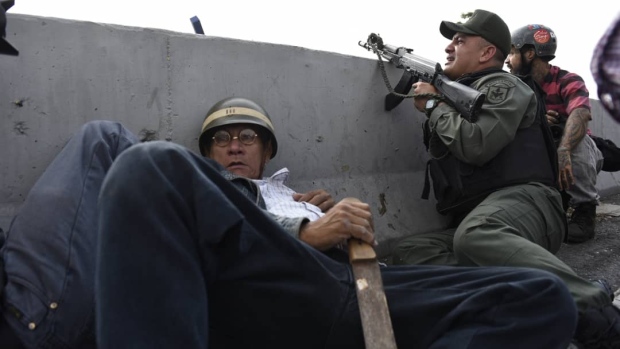Apr 30, 2019
Venezuela’s Guaido claims military support to take power in Caracas
, Bloomberg News

Venezuelan opposition leader Juan Guaido on Tuesday went to a military base in the nation’s capital to proclaim the end of socialist President Nicolas Maduro’s regime and called for a military uprising.
The outcome of the high-stakes gambit remained unclear as protesters gathered despite billowing tear gas and the regime promised punishment for any who joined a rebellion. No high-ranking officers had announced their support for Guaido, but hundreds of residents took to the streets to support him, with whistles and shouts of “coup.”
Leopoldo Lopez, Guaido’s ally and mentor long held under house arrest, was freed and accompanied him to La Carlota military base in Caracas, where they spoke on a highway outside as hundreds gathered. They were flanked by dozens of national guard members who concealed their faces with masks and wore blue bracelets and armbands to signal their allegiance.
“The definitive cessation of the usurpation began today,” Guaido said in a video posted to social media. “Today, brave soldiers, brave patriots, brave men attached to the constitution have come to our call.”
It was unclear how many members of Venezuela’s armed forces had rallied to their side, but the uprising, which prompted residents to erupt and security forces to deploy riot forces, was the strongest bid yet to topple Maduro. Under his autocratic rule, the nation has fallen into grinding misery. The mainstay oil industry is at a near standstill, the U.S. has levied punishing sanctions and hyperinflation has led to the impoverishment of millions.
The regime promised the rebellion would be quelled.
Venezuela is "confronting and deactivating a small group of military traitors" who positioned themselves "to promote a coup d’etat against the constitution and the peace of the Republic," Information Minister Jorge Rodriguez said on Twitter. He called on citizens to resist them.
Guaido, the head of the National Assembly, has said the constitution makes him the nation’s rightful leader because Maduro stole his election last year. The U.S. and dozens of other nations recognize him as the president.
U.S. Secretary of State Michael Pompeo said on Twitter that ”the U.S. Government fully supports the Venezuelan people in their quest for freedom and democracy.” Earlier on Tuesday, Senator Marco Rubio called for Venezuela’s military to back Guaido.
At La Carlota, an air base that dominates the center of the city, residents hurled rocks at security forces and the scene was a confused whirl. There were dozens of masked soldiers, a handful of opposition activists and a few hundred protesters. A steady stream of opposition supporters arrived carrying flags and riding on motorcycles. There were periodic volleys of tear gas, and when government anti-riot soldiers approached the bridge to the base, guardsmen who had defected to Guaido fired into the air.
The base itself was unbreached and Defense Minister Vladimir Padrino said armed forces across the nation remained loyal to Maduro, with barracks normal and commanders in full control. Internet services were cut throughout Venezuela and access to the city’s main highway was blocked.
“We stand firm in the defense of constitutional order and the republic’s peace, supported by law, reason and history,” he said. “Loyal always, traitors never.”
The regime moved quickly to intensify control of the city. Security forces cut off the city’s main highway, halting traffic heading in both directions. Supporters of Maduro asked for residents to rally outside Miraflores, the presidential palace, in a show of strength. YouTube, Bing, Google and Android services are currently restricted in Venezuela, according to NetBlocks, an organization that monitors cybersecurity and freedom on the internet.
Dramatic Return
The reappearance of Lopez was a dramatic turn that appeared calculated to reinvigorate an opposition movement that had stalled since Guaido attempted in February to bring humanitarian aid across the nation’s borders. The effort, meant to catalyze resistance, was met with violence and supplies burned on an international bridge.
“This is the morning for all us to go out to the streets, civilians and soldiers,” he told reporters Tuesday morning at La Carlota. Lopez, who wore the blue bracelet of rebellion, said he was freed by his captors. “Today, we are convinced this process is irreversible.”
After speaking, Guaido and Lopez disappeared from the scene as government forces deployed a thick blanket of gas. Later in the morning, Guaido spoke to defectors and other protesters on the city’s main highway.
Lopez helped orchestrate Guaido’s ascent from his house arrest. They met more than a decade ago during protests against Meduro’s own political tutor, Hugo Chavez, was executing his ultimately disastrous brand of socialism.
Lopez maneuvered for his Popular Will party to assume the presidency of the gutted legislature. He then tapped Guaido, serving his first full term as a lawmaker, who rose to the helm of their party in Venezuela after more senior Popular Will politicians were exiled.
Guaido has been a loyal acolyte of Lopez for years, standing beside him at a 2014 news conference when the activist announced a strategy of anti-Maduro unrest. What was called “The Exit” bitterly divided the opposition because it came less than a year into Maduro’s presidency, when support for his rule was still strong.










